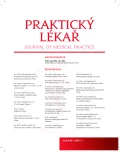Chronic stress as a risk factor for the incidence and progression of cancer?
Authors:
V. Bencko; CH. Appelman
Authors‘ workplace:
Přednosta: prof. MUDr. Milan Tuček, CSc.
; Ústav hygieny a epidemiologie 1. LF UK a VFN, Praha
Published in:
Prakt. Lék. 2019; 99(1): 18-20
Category:
Of different specialties
Overview
Acute stress response is a physiological response to the onset of stress of homeostatic mechanisms. The transition to its chronic phase then enters due to the continuous or too intense perception of the threat. The reaction denoted by maladaptation is permanently activated, although it is not an asset but a burden for the organism. Through neurohumoral and immune-modulation mechanisms, stress, especially chronic one, increases perception of physical and mental exertion, such as feelings of isolation, lack of support, hopelessness and a feeling of dissatisfaction (typically, for example, in breast cancer patients). The difficulty in finding a causal relationship in this context is the fact that epidemiological studies on chronic stress often do not meet the demanding requirements of evidence-based medicine. Various neurohumoral and immunodisruptive mechanisms, increased levels of chronic psychological distress, such as, feelings of isolation, lack of support, hopelessness and dissatisfaction trigger cellular events leading to increased cancer progression, metastasis and poorer survival for cancer patients. Numerous studies, in particular on breast cancer patients, have showed these results. The results on cancer risk and stress levels are not still satisfactory and more and better designed epidemiological studies need to be undertaken to reach a more definite conclusion. A deeper understanding of the mechanisms involved in the carcinogenesis process can help to develop individual strategies for early diagnosis and effective treatment based on the specific characteristics of the individual patient. The importance of early diagnosis of disease risk as well as positive responses to early treatment was proven.
Keywords:
chronic stress – maladaptation, neurohumoral mechanisms – immune modulating mechanisms – incidence of neoplasms – cancer progression – early diagnosis
Sources
1. Lutgendo SK, Cole S, Costanzo E, et al. Stress-related mediators stimulate vascular endothelial growth factor secretion by two ovarian cancer cell lines. Clin Cancer Res 2003; 9(12): 4514–4521.
2. Marucha PT, Crespin TR, Shelby RA, Andersen BL. TNF-alpha levels in cancer patients relate to social variables. Brain Behav Immun 2005; 19(6): 521–525.
3. Reiche EM, Nunes SO, Morimoto HK. Stress, depression, the immune system, and cancer. Lancet Oncol 2004; 5(10): 617–625.
4. Thornton LM, Andersen BL, Crespin TR, Carson WE. Individual trajectories in stress covary with immunity during recovery from cancer diagnosis and treatments. Brain Behav Immun 2007; 21(2): 185–194.
5. Blomberg BB, Alvarez JP, Diaz A, et al. Psychosocial adaptation and cellular immunity in breast cancer patients in the weeks after surgery: an exploratory study. J Psychosom Res 2009; 67(5): 369–376.
6. Andersen BL, Farrar WB, Golden-Kreutz D, et al. Stress and immune responses after surgical treatment for regional breast cancer. J Natl Cancer Inst 1998; 90(1): 30–36.
7. Lutgendorf SK, DeGeest K, Sung CY, et al. Depression, social support, and beta-adrenergic transcription control in human ovarian cancer. Brain Behav Immun 2009; 23(2): 176–183.
8. Chida Y, Hamer M, Wardle J, Steptoe A. Do stress-related psychosocial factors contribute to cancer incidence and survival? Nat Clin Pract Oncol 2008; 5(8): 466–475.
9. Duijts SF, Zeegers MP, Borne BV. The association between stressful life events and breast cancer risk: a meta-analysis. Int J Cancer 2003; 107(6): 1023–1029.
10. Bowen DJ, Ritenbaugh C. Influence of stressors on breast cancer incidence in the Women’s Health Initiative. Health Psychol 2009; 28(2): 137–146.
11. Steel JL, Geller DA, Gamblin TC, et al. Depression, immunity, and survival in patients with hepatobiliary carcinoma. J Clin Oncol 2007; 25(17): 2397–2405.
12. Satin JR, Linden W, Phillips MJ. Depression as a predictor of disease progression and mortality in cancer patients: a meta-analysis. Cancer 2009; 115(22): 5349–5361.
13. Kroenke CH, Kubzansky LD, Schernhammer ES, et al. Social networks, social support, and survival after breast cancer diagnosis. J Clin Oncol 2006; 24(7): 1105–1111.
14. Sapolsky RM, Krey LC, McEwen BS, Stress down-regulates corticosterone receptors in a site-specific manner in the brain. Endocrinology 1984; 114(1): 287–292.
15. Sapolsky RM, Krey LC, McEwen BS, Glucocorticoid-sensitive hippocampal neurons are involved in terminating the adrenocortical stress response. Proc Natl Acad Sci USA 1984; 81(19): 6174–6177.
Labels
General practitioner for children and adolescents General practitioner for adultsArticle was published in
General Practitioner

2019 Issue 1
- Advances in the Treatment of Myasthenia Gravis on the Horizon
- Hope Awakens with Early Diagnosis of Parkinson's Disease Based on Skin Odor
- Memantine in Dementia Therapy – Current Findings and Possible Future Applications
- Memantine Eases Daily Life for Patients and Caregivers
- Possibilities of Using Metamizole in the Treatment of Acute Primary Headaches
-
All articles in this issue
- Život s Crohnem – pohled z kožní ordinace + autentické sdělení pacientky
- Chirurgie a tělocvik
- Odešel nestor olomouckého tělovýchovného lékařství: prof. MUDr. Zdeněk Jirka, CSc. (1928–2018)
- Epidemie chytrých telefonů Nebezpečí pro zdraví, vzdělání a společnost
- Proton radiation therapy in the treatment of solid tumours
- The workload of general paediatricians in Czechia as viewed by the physicians themselves
- Chronic stress as a risk factor for the incidence and progression of cancer?
- Personal dignity of a patient with multiple sclerosis: interpretative phenomenological analysis
- Attitude of doctors and managers of outpatient healthcare facilities on received complaints
- Health literacy of the Romany minority in the Czech Republic
- General Practitioner
- Journal archive
- Current issue
- About the journal
Most read in this issue
- Chronic stress as a risk factor for the incidence and progression of cancer?
- Proton radiation therapy in the treatment of solid tumours
- Personal dignity of a patient with multiple sclerosis: interpretative phenomenological analysis
- Health literacy of the Romany minority in the Czech Republic
